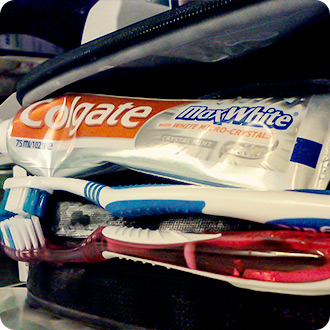Choosing the best toothpaste these days can be something of a nightmare and leave you with the condition that psychologists call ‘options paralysis’. In other words, you’ll be forced to choose between tooth whitening toothpastes, toothpastes that strengthen your enamel, toothpastes that are good for your breath and toothpastes that are ‘antibacterial’. That’s all very well and good but really shouldn’t your toothpaste already be doing all of those things? How can you possibly pick between all those benefits?
 This might lead you to wonder whether whitening toothpastes are really effective, or whether they may in fact just be a marketing ploy. Can they really whiten your teeth any more than the other options? And if so, then how? And are other toothpastes non whitening?
This might lead you to wonder whether whitening toothpastes are really effective, or whether they may in fact just be a marketing ploy. Can they really whiten your teeth any more than the other options? And if so, then how? And are other toothpastes non whitening?
How Whitening Toothpastes Work
The good news is that whitening toothpastes can work, and for the most part they do. The issue is just how well they work and whether or not they’re really worth the money.
When it comes to how they are working, this varies a lot from toothpaste to toothpaste. The important thing to realise though is that all of them are really only cleaning slight stains from the very surface of the teeth which will brighten your teeth more than whiten them, and which will be a temporary solution at best.
To an extent, all toothpastes will do this, but those marked whitening will generally contain substances that are a little more effective in specifically removing surface stains. For instance many will include abrasives like carbamid peroxide and sodium lauryl sulphate. Others have enzymes such as papain, citric acid, sodium tripolyphosphate, triclosan and more. Bromelain and malic acid, found in pineapples and apples are also commonly included.
Blue covarine meanwhile is a substance which can bind to the surface of the teeth and that way help to lessen the appearance of yellowing almost immediately. Note that this is effectively an optical illusion pretty much rather than making any real change to your teeth… but if it’s an aesthetic effect you’re going for then this isn’t necessarily a bad thing.
Smarter toothpastes contain ingredients that are designed to prevent future staining – such as polyvinylpyrrolidone. Prevention is the best cure… They all also should contain the same substances such as fluoride that are found in other toothpastes in order to protect against tooth decay and other problems.
Negative Side Effects?
So in effect, toothpastes work by using slightly acidic substances to melt away surface stains, and in the case of blue covarine might also be useful for neutralising some of the yellowness. This is a moderate effect that may be useful for some people, but is it good for you?
Unfortunately the answer is ‘not entirely’. Over time you see, abrasive toothpastes can also degrade your enamel. This is the protective outer layer of your tooth which gives it its natural shine. Underneath the layer of enamel is dentine which is porous and this is one of the things that can make teeth sensitive.
So Are They Worthwhile?
So with all that in mind… are whitening toothpastes really worthwhile? Well, if you’re looking to reduce the appearance of some surface stains then they may be somewhat effective by gently dissolving those stains and potentially fixing discoloration in the short term. If you’ve noticed that your teeth have yellowed over time and you want to do something about it, then using them for a week may help and won’t hurt. (Though eating some apples during the day might be just as effective).
On the other hand, tooth whitening toothpastes aren’t able to change the natural colour of your teeth, and they can’t fix stains that go deeper than the surface… so they aren’t a ‘magic fix’ by any means. For more serious stains you’ll need to see your dentist.
And seeing as whitening toothpastes can damage your enamel slightly over time – which is a lot worse than having a few darker looking teeth – it probably isn’t advisable to use them for the long haul. Overall then, it’s not looking great for whitening toothpastes!



